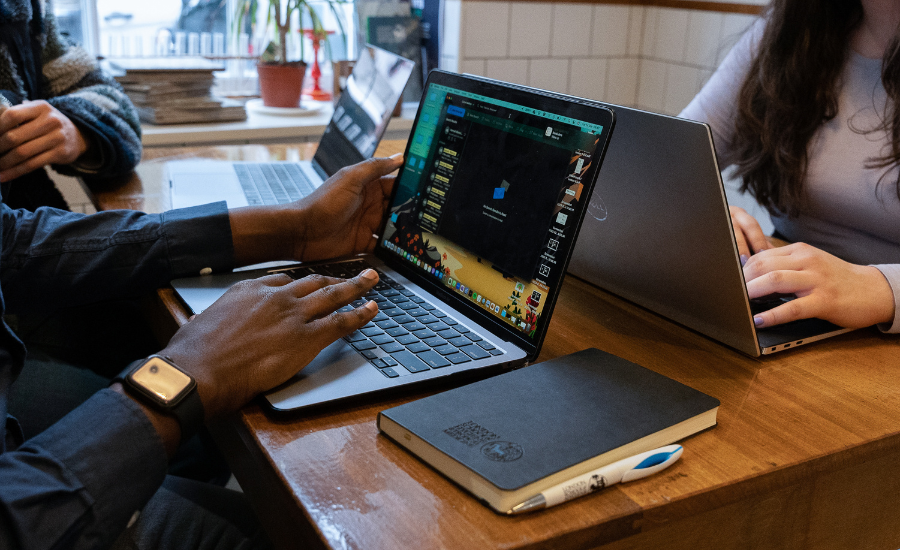Support services and skill-building opportunities at LSHTM: Jenny & Gabi's experiences
24 July 2024 London School of Hygiene & Tropical Medicine London School of Hygiene & Tropical Medicine https://lshtm.ac.uk/themes/custom/lshtm/images/lshtm-logo-black.png
Students using their laptop in a cafe.
MSc Health Data Science student Jenny shares her experience using services and joining workshops during her year at LSHTM.
Counselling
For any incoming students, I highly recommend signing up for counselling! The process is very easy: you register yourself with Student Counselling, and then they’ll organise an evaluation form for you to fill and an initial consultation. Once that’s all done, you’ll be assigned a counsellor who you meet once a week. In my counselling sessions, I’ve not only talked about the stress from schoolwork, but also traumas from childhood which lay the foundations of who you are today. The professional guidance I received help me see things from a different light and maintain a balanced approach to my studies and personal life.
Careers Service
The Careers Service has been very helpful and hands-on – a big thank you to the team, especially Josh Philips. For incoming students, I recommend booking a session early (in the first term!) for an initial chat and some early questions you might have. I attended numerous seminars and personal meetings that have enhanced my abilities. The lunchtime sessions have been useful, for example, tips and tricks to writing up your LinkedIn page and how to open conversations with your connections.
As the School is part of the University of London (UoL), they have also organised a series of Digital Toolbox in the first term which I highly recommend joining. Tools shared include: CareerSet, an AI site that scores your CV and cover letter based on a job description, and Graduates First, which offers resources such as practice aptitude tests, games, and video interviews. You can find details about these sessions under ‘Forthcoming workshops and events’ on the Careers’ Moodle page.
Pentacell
Pentacell is a School-wide activity to strengthen the School community, and you’re assigned a group of 5-6. I recommend taking an active role in organising meet-ups every week, which I know my team has appreciated. It was a useful way to know your classmates more, and as the year progresses, we still meet regularly and work on assessments together. Our group has exemplified the success of the Pentacell initiative!
Digital Skill Workshops
The Digital Learning Team at Centre for Excellence in Learning and Teaching (CELT) hosts a series of digital workshops throughout the year. You can find details and book via the Digital Workshops portal. These sessions are delivered either face-to-face or remote, and usually during lunchtime, providing great flexibility for you to work around your timetable.
Coming from a non-academic background, I find the sessions on EndNote extremely useful as they cover its usage end-to-end. Similarly, ‘Effective Literature Searching’ was another great session where you walk away with practical skills on the different databases, where to access them and how to search within them. Having a more commercial background, I have also joined the Tableau session where you are given a Word Doc of exercises and work your way through it – it was a very practical session!
Gabi from MSc Public Health for Development shares her experiences joining some of the Digital Skill Workshops.
2-day introduction training on Geographical information systems (GIS)
During the term break in April, I had the opportunity to participate in an in-person training focused on Geographic Information Systems (GIS), a vital tool for those of us working in the public health domain. GIS plays a crucial role in identifying the locations of vulnerable populations and their proximity to the nearest healthcare facilities. This invaluable information enables us to pinpoint potential barriers to accessing health services, empowering us to bring service delivery closer to communities and address health inequities more effectively.I chose to do an in-person session because I find it much easier to follow the explanation and to be able to ask questions as we go. I am really glad that I had the chance to do this workshop. I look forward to using this skill for my summer project.
- Conceptual Framework for Research
I participated in this two-hour workshop with Prof. Cathy Zimmerman to help me with ideas on how to formulate a conceptual framework for my qualitative research for my summer project. - Data Management with STATA
This workshop was divided into two sessions: each two to three hours long. I had the chance to use STATA for some modules: STEPH (Statistics for Epidemiology and Population Health) module in the first term and Applying Public Health Principles (APHP).
The two workshops offered us an opportunity to work on datasets, clean and append them, and analyze them using the STATA commands. Data analysis is one of the most important skills for us working in the public health space: being able to conduct data analysis and be able to critically appraise them and use the evidence in our policy-making. - Endnote
This practical skill workshop has helped me a lot during my assignments here at LSHTM. Using Endnote saves me so much time - it is life-changing! The instructor, Sia Salehian is super kind. I contacted him several times with follow-up questions about using EndNote, and he was always very patient and kind to spare his time to walk me through each step.
- Read Shereen's experience and the transferrable skills she gain from workshops and services at LSHTM.
- Discover MSc Public Health for Development & MSc Health Data Science.
- Contact Gabi and Jenny via our contact student ambassador page.